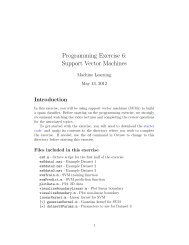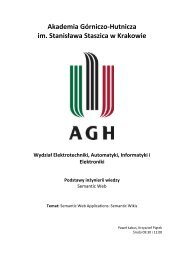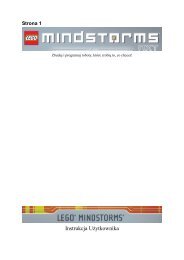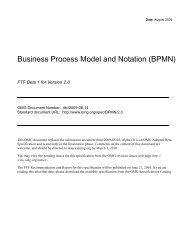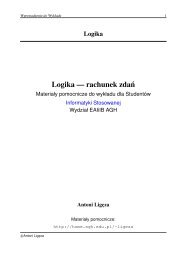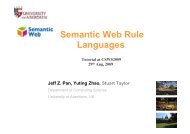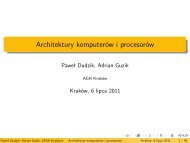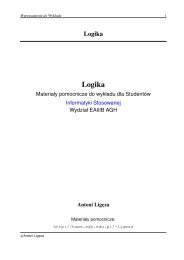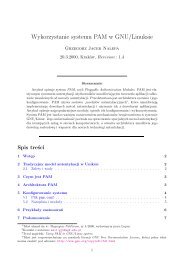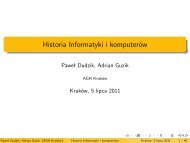An Evaluation of Knowledge Base Systems for Large OWL Datasets
An Evaluation of Knowledge Base Systems for Large OWL Datasets
An Evaluation of Knowledge Base Systems for Large OWL Datasets
Create successful ePaper yourself
Turn your PDF publications into a flip-book with our unique Google optimized e-Paper software.
tant question is how well existing systems support these conflicting requirements. Furthermore,<br />
different applications may place emphasis on different requirements.<br />
It is difficult to evaluate KBSs with respect to these requirements, particularly in<br />
terms <strong>of</strong> scalability. The main reason <strong>for</strong> this is that there are few Semantic Web datasets<br />
that are <strong>of</strong> large size and commit to semantically rich ontologies. The Lehigh<br />
University Benchmark is our ef<strong>for</strong>t in order to fill this gap. We have developed the<br />
benchmark to facilitate the evaluation <strong>of</strong> those KBSs in a standard and systematic<br />
way. The benchmark contains a simulated ontology <strong>for</strong> the university domain and supports<br />
generating extensional data in arbitrary sizes. It <strong>of</strong>fers fourteen test queries over<br />
the data. It also provides a set <strong>of</strong> per<strong>for</strong>mance metrics and related facilities <strong>for</strong> the<br />
evaluation.<br />
By making use <strong>of</strong> the benchmark, we have per<strong>for</strong>med an evaluation <strong>of</strong> four KBSs<br />
<strong>for</strong> the Semantic Web from several different aspects. We have evaluated two memorybased<br />
systems (<strong>OWL</strong>JessKB and memory-based Sesame) and two systems with persistent<br />
storage (database-based Sesame and DLDB-<strong>OWL</strong>). We present our experiment,<br />
discuss the per<strong>for</strong>mance <strong>of</strong> each system, and show some interesting observations.<br />
<strong>Base</strong>d on that, we highlight some issues with respect to the development and<br />
improvement <strong>of</strong> the same kind <strong>of</strong> systems, and suggest some potential ways in using<br />
and developing those systems.<br />
The outline <strong>of</strong> the paper is as follows: Section 2 elaborates on the Lehigh University<br />
Benchmark. Section 3 describes the a<strong>for</strong>ementioned experiment and discusses the<br />
results. Section 4 talks about related work. Section 5 concludes.<br />
2 Lehigh University Benchmark <strong>for</strong> <strong>OWL</strong><br />
We have developed the Lehigh University Benchmark (LUBM) to evaluate the per<strong>for</strong>mance<br />
<strong>of</strong> Semantic Web KBSs with respect to extensional queries over a large<br />
dataset that commits to a single realistic ontology. Extensional queries are queries<br />
about the instance data <strong>of</strong> ontologies. Recognizing that on the Semantic Web, data<br />
will by far outnumber ontologies, we wanted to develop a benchmark <strong>for</strong> this. There<strong>for</strong>e,<br />
we chose to generate large amount <strong>of</strong> data <strong>for</strong> a single ontology <strong>of</strong> moderate size.<br />
LUBM was originally developed <strong>for</strong> the evaluation <strong>of</strong> DAML+OIL [9] repositories<br />
[13]. As <strong>OWL</strong> became the W3C recommendation, we have extended the benchmark<br />
to provide support <strong>for</strong> <strong>OWL</strong> ontologies and datasets. We introduce the key components<br />
<strong>of</strong> the benchmark suite below.<br />
2.1 Benchmark Ontology<br />
The ontology used in the benchmark is called Univ-Bench. Univ-Bench describes universities<br />
and departments and the activities that occur at them. Its predecessor is the<br />
Univ1.0 ontology 1 , which has been used to describe data about actual universities and<br />
departments. We chose this ontology expecting that its domain would be familiar to<br />
1<br />
http://www.cs.umd.edu/projects/plus/DAML/onts/univ1.0.daml



